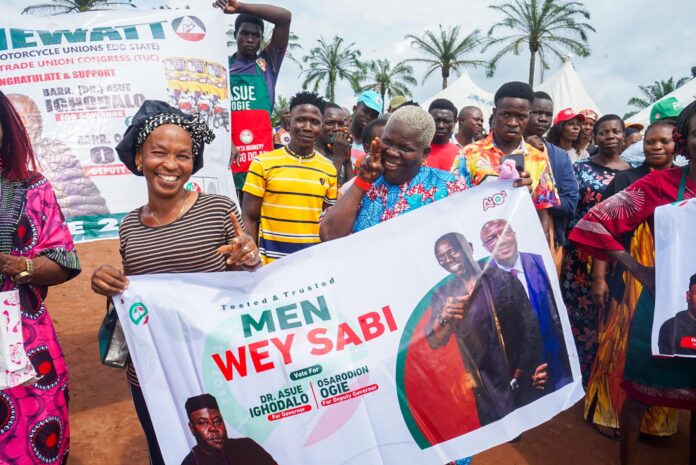The Independent National Electoral Commission (INEC) has turned down the Peoples Democratic Party (PDP)’s call to remove the Resident Electoral Commissioner (REC) in Edo State, Anugbum Onuoha.
INEC’s rejection comes just days before the crucial Edo governorship election scheduled for September 21, 2024.
INEC has urged the PDP to concentrate on the electoral process rather than focus on the REC.
The call for the REC’s removal was triggered by some PDP chieftains, including Governor Godwin Obaseki and the state party chairman, Anthony Aziegbemhin, who expressed concerns about Onuoha’s impartiality.
Obaseki and other party leaders feared that Onuoha’s alleged close relationship with the Minister of the Federal Capital Territory, Nyesom Wike, could lead to election manipulation in favor of the All Progressives Congress (APC).
Their concerns were formally expressed in a protest letter addressed to the INEC Chairman, Mahmood Yakubu, which was delivered by Aziegbemhin.
In the letter, Aziegbemhin demanded the immediate redeployment of Onuoha, citing his previous roles as Commissioner and Special Adviser for Lands, Survey, and Housing under Wike’s administration in Rivers State.
The PDP leadership argued that the relationship between Wike and Onuoha was too close to ignore, pointing out that the two were cousins and close associates.
Aziegbemhin warned that these ties could potentially compromise the integrity of the election, as Onuoha might favor APC due to his connection with Wike.
The controversy gained momentum after Wike himself, in an interview on Channels TV’s *Politics Today*, acknowledged his family connection to Onuoha.
However, Wike dismissed concerns about Onuoha’s ability to conduct his duties fairly, insisting that his cousin would remain impartial.
Wike emphasized that Onuoha was fully capable of overseeing the electoral process without being influenced by family ties or political affiliations.
Despite Wike’s assurances, the PDP continued to push for the REC’s removal, further heightening tensions ahead of the governorship election.
In response to the escalating controversy, INEC’s Chief Press Secretary, Rotimi Oyekanmi, issued a statement urging the PDP to focus on the election itself rather than the REC.
Oyekanmi made it clear that INEC had no intention of redeploying Onuoha, emphasizing that the election would take place in over 4,500 polling units, not in the REC’s office.
He explained that the election results would be declared by Presiding Officers at the polling units after voting, sorting, and counting of ballots, with accredited party agents and other stakeholders present.
“The Resident Electoral Commissioner for Edo State will not be redeployed,” Oyekanmi stated. “The governorship election will be conducted in 4,519 polling units, not in the REC’s office.”
He further explained that after voting at each polling unit, the Presiding Officer would take a picture of the result sheet using the Bimodal Voter Accreditation System (BVAS) and upload it to the INEC Result Viewing (IReV) portal.
Oyekanmi noted that the IReV system is used for transparency purposes and is not a substitute for electronic voting or the electronic collation of results, which the Nigerian constitution does not yet recognize.
Copies of the polling unit results would also be distributed to accredited party agents, ensuring transparency throughout the process.
The Chief Press Secretary also explained the subsequent stages of collation, which would occur before the final results are declared at the State Collation Centre in Benin City.
He urged the PDP to focus on these processes rather than the REC, assuring them that the election would be transparent and that no political party would be favored.
Oyekanmi stressed that INEC does not rig elections, reminding the public that the commission had conducted two successful governorship elections in Edo State in 2016 and 2020 without accusations of rigging.
“INEC does not rig elections. The current commission conducted two governorship elections in Edo State in 2016 and 2020 successfully, and nobody accused us of rigging,” he said.
Oyekanmi assured political parties, registered voters, and other stakeholders that INEC would provide a level playing field for all candidates, without giving any advantage to any political party.
While addressing concerns raised by PDP, INEC continued preparations for the upcoming election, including the distribution of accreditation tags to journalists.
On Monday, INEC began issuing identification tags to reporters accredited to cover the governorship election in Edo State.
The distribution of tags took place at the Nigeria Union of Journalists (NUJ) secretariat in Benin City, Edo State.
According to Sam Olumekun, INEC’s National Commissioner and Chairman of Information and Voter Education, 114 media organizations had successfully uploaded the details of 721 personnel to cover the election.
Olumekun also confirmed that the list of accredited media personnel had been uploaded to the INEC website and social media platforms, ensuring transparency in the accreditation process.

